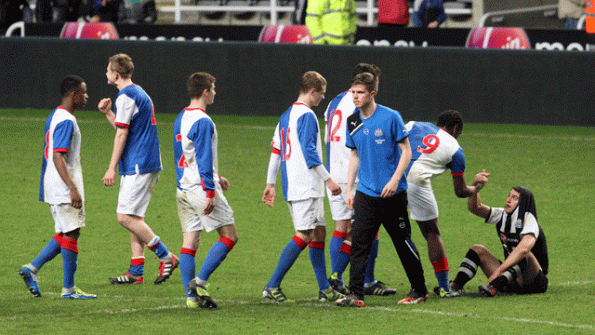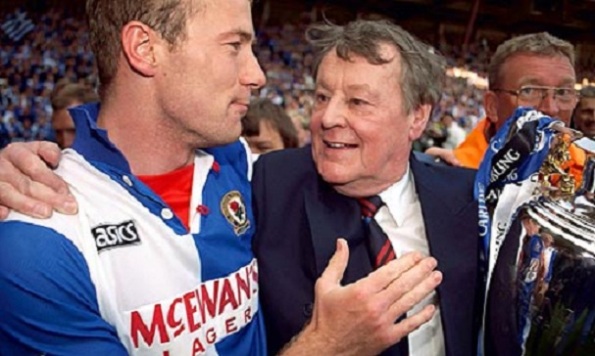Archive
Jack Walker’s Legacy: The Blackburn Rovers Academy
When Jack Walker officially took over Blackburn Rovers in January 1991, even the most day-dreaming of supporters could not have foreshadowed what lay ahead for the club. Threatened with relegation from the old Second Division (equivalent to Championship) at the time, the club would become champions of the English Premier League in fours years. Walker restructured Ewood Park, building the Jack Walker Stand, spending approximately £20 million to do so. Money was no issue, for a period at the club, with some of the best of British talents joining the club, from manager Kenny Dalglish to Alan Shearer, Chris Sutton, David Batty, Graeme Le Saux, and Tim Sherwood among others. Supporters have had to endure taunts of having “bought” the Premier League title, even though the club spent just under £2 million more than second place Manchester United in assembling its squad. In fact, Manchester United spent more money on transfers that season than Rovers had. Uncle Jack, as he is affectionately known, would also invest in the town of Blackburn and is regarded as a hero within the community as much as within the football club.
Walker watched tearfully as his beloved Rovers side confirmed its relegation with a 0-0 draw at Ewood Park against Manchester United near the end of the 1998/99 season. He wouldn’t live to see Rovers gain promotion as he passed away, aged 71, at the start of their promotion campaign of 2000/01. Two of the players that played a key role in getting Rovers back to the Premier League had been David Dunn, still at the club today, having returned from a spell at Birmingham City, and Damien Duff, now at Fulham. Marlon Broomes, Martin Taylor, Damien Johnson, and Jonathan Douglas all played some role during that season. All 6 players were products of the successful Academy. As was Jack Walker’s ultimate goal with Rovers, he wanted to make it a self-financing club in the long-term, mirroring the Manchester United youth development of the early-to-mid nineties. It was in 1996, that an official “youth structure” was put in place at the club, bringing in players such as Dunn and Duff into the system even before the current facilities existed. The class of Dunn and Duff was losing finalists in the FA Youth Cup in 1998. However, it would be a few months after Jack Walker’s passing that his brainchild, the Academy would be inaugurated.
The Brockhall Village Academy, opened in 2001, cost approximately £4.75 million as state of the art facilities on par with top training facilities anywhere in Europe. It includes 6 full-size pitches, indoor training facilities, indoor running track, outdoor running “hill”, a swimming pool, goalkeeper training facilities as well as accommodation for the youth players. In the 2001 FA Youth Cup, Rovers would be losing finalists again. In terms of league activity, the Rovers youth side won the U-17 Premier Academy League in the 1998/1999 and the U-19 Premier Academy League in 2002/3 before the U-19 and U-17 leagues were merged to form the U-18 Academy Premier League in 2004/5, when Rovers won the inaugural edition. In fact, when it comes to a roll of honor in the Premier Academy League, Blackburn Rovers are the second most successful side after Arsenal, winning 3 leagues, compared to Arsenal’s 5. Rovers and Arsenal are the only ever sides to have won Academy Premier Leagues in all 3 age categories. Even West Ham’s heralded Youth Academy, has not tasted any glory, in the aftermath of producing the “Golden Generation” of 1998-2000, boasting the likes of Joe Cole, Michael Carrick and Frank Lampard, when they lifted 1 FA Youth Cup and back-to-back U-19 Academy Premier League titles.
In terms of coaching and managing the set-up, Bobby Downes, formerly involved with youth football at Aston Villa, Port Vale and Watford, where he was Director of Youth Football, under former England manager, Graham Taylor, was recruited in 1997 to a similar role at Rovers, eventually being the man responsible for running the Academy when it was officially set-up. The thinking ahead was important in terms of strategic planning from the club in the mid-1990’s, putting into place the tools necessary to maximize the output from the structure even before it may have physically been there. During his tenure, Downes oversaw numerous players from under his stewardship being promoted to the Rovers first team squad, some more permanently than others. They included Dunn, Duff, Martin Taylor, Jay McEveley, Paul Gallagher, Matt Derbyshire, Junior Hoilett, and Martin Olsson, who was recruited to the Academy at the age of 17 from Sweden in 2006. In some cases, even when certain players were deemed not good enough for the Rovers first team, they were sold off, usually to Championship clubs, and thus raised important revenue for the club. That list included players such as Damien Johnson, Ben Burgess, Neil Danns, Jemal Johnson, and Jonathan Douglas. Under his stewardship, Rovers youth excelled in competitive football as illustrated through their performances in both the Academy Premier League and FA Youth Cup. In the summer of 2009, whilst Sam Allardyce was manager, Bobby Downes left the club by mutual consent. Phil Cannon was recruited to become the new Academy Manager.
Cannon, boasting an impressive background in youth development, was previously Head of Youth Development at Swindon, where he oversaw the early development of Theo Walcott, but more recently was Head of Recruitment at Everton, who are widely regarded as running one of the best youth set-ups in the country, producing an endless array of players including Wayne Rooney, Francis Jeffers, Leon Osman, Jack Rodwell and most recently Ross Barkley among others. Cannon, interviewed at the time of hiring, by the official Rovers website stated, “If that first team was full of local boys, it would be fantastic because they are playing for ‘their’ team. I think the locals can identify more with them and I think the local boys do try a little bit harder”. Since then, Phil Jones, Grant Hanley, Adam Henley, Josh Morris, Jason Lowe, and Nick Blackman have been promoted to the first team squad, with some such as Jones, Hanley and Lowe playing integral roles during the last couple of seasons. Obviously, some of the credit for their development still lay with the previous regime under Downes, nevertheless, the good work that the current staff including Cannon, Alan Miller as Head of Recruitment, David Lowe as Head of Youth Coaching, as well as team coaches for the U-18 and U-16 sides, Terry McPhillips, Simon Ireland and Tony Grant cannot go unnoticed.

Rovers youngsters celebrate beating Newcastle in the Quarter Finals of FA Youth Cup in February, 2012
The current edition of the Rovers youth set-up has seen the U-18 side make the semi-finals of the FA Youth Cup where they will play bitter rivals Burnley in a two-legged affair. Labelled by on-lookers as possibly the best batch of talent to come through Brockhall at once, a number of key players have alternated between Reserves League football and the Academy Premier League this season. Stand-out performers include the cream of the crop Hugo Fernandez, a young Spaniard, who only turned 18 earlier this year and can play anywhere along the middle of the pitch, from defence to an attacking midfield position. He has taken strides in his development this season as he has been given a more advanced role compared to his early times at the club. He has recently been making more regular appearances for the Reserves although still plays a crucial role at Academy level especially in the FA Youth Cup. John O’Sullivan is a young Irish midfielder who is comfortable across midfield and has played a few times for the Reserves this season too. He’s also been capped at U-19 level by Ireland. Jack O’Connell, a left sided defender comfortable at center back or left back was capped by the England U-18 side in March 2012. Robbie Cotton, long hailed as one of the best players that the Academy had produced, judging by the player’s potential, has been promoted to the first team squad this season, although he has yet to make an appearance for them. He is still involved in the FA Youth Cup and scored the winning penalty in a thrilling Quarter Final victory over Newcastle, and features regularly for Gary Bowyer’s Reserve side.
If Blackburn Rovers overcome Burnley, they would be a step closer to winning the FA Youth Cup for the first time since 1959, something that players such as Duff, Dunn, or Jones failed to do, as well as confirming their promise. Considering the club’s current fortunes on and off the pitch, it would not be beyond the scope of reality if some of the current Academy batch began featuring for the first team squad by next season. At the same time, the Blackburn Rovers Academy has helped fund itself and more-over through the transfer of players. All in all, just under £60m has been raised since 1994 through the transfer of players, an average of £3.3m a year. Some of the players have ended up winning Champions Leagues, Premier Leagues, and have gone on to play at World Cups and European Championships for their countries. Rovers hold 2 of the top 5 most expensive Academy transfers in English football history, with both Damien Duff and Phil Jones, who cost their future clubs a reported £17m each. Only Andy Carroll, Wayne Rooney, Rio Ferdinand and Owen Hargreaves (if you want to include cross-border transfers) have ever gained their respective academies more money. Considering the overall picture, coupled with Blackburn being a town in arguably the most hotly-contested catchment area for recruitment of youth players, with up to 30 clubs, in competing for youngsters in the North West, it becomes clear that the backbone of the Academy factory floor has been key in maintaining Blackburn Rovers position on and off the pitch in the Premier League, in what was Uncle Jack’s parting and, hopefully, eternal, gift to the club.

Honorable mentions for Shay Given who was signed by Blackburn Rovers as an 18 year old before progressing to the first team squad. He was transferred to Newcastle United shortly after. Anthony Pilkington of Norwich City was part of the Youth Academy but was let go of
If you like the authors work please Follow @BabakGolriz




